This post is for Science & Sensibility's "Healthy Birth Blog Carnival #6: Keep mother and baby together after the birth." Check back at Science & Sensibility for other entries when the carnival goes live!
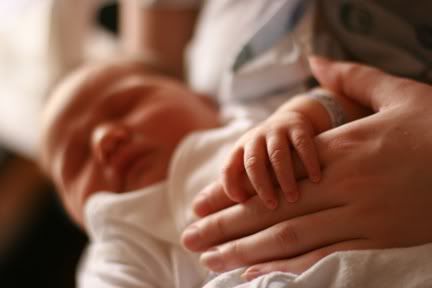
For all my complaining about my hospital-birth experience, one thing they did exactly right: They let me keep my baby in my room the whole time I was there.
The days of having your baby wheeled down the hall to a newborn-packed nursery, for visitors to peer at through a glass window in the vain hope of identifying a relative among all the bassinets, is thankfully becoming a rarer occurrence. If you're birthing at home and cosleeping, rooming in will happen naturally. If you've given birth by cesarean, there might be a delay while you and the baby are cared for separately. If your baby was premature or is having any health difficulties, your baby might need extra care in the NICU, which might or might not allow for rooming-in. But, in most cases of hospital birth, it's possible and safe to keep your baby in the room with you at all times. Sam, Mikko, and I stayed together from the time we entered our room, three hours prior to the birth, until we all exited as a new family two days later, and it was absolutely the best way I can think of handling it.
Here's a rundown of the main reasons why you, too, should consider rooming-in with your baby a requirement after your birth. For more information and sources, please see the Lamaze Healthy Birth Practice Paper #6.
- You will get to sleep. Mothers who practice rooming-in get the same amount of sleep on average as those whose babies go to the nursery at night. I know I would have been very uneasy to have my sweet new baby out of my sight, and would have stayed up worrying about how he was doing!
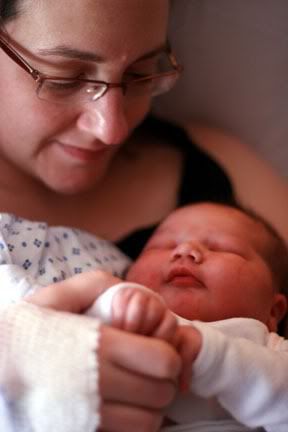
- Your baby will get more sleep. Babies who room in cry less and spend more time resting. This is probably partially due to the bright lights and bustle of the hospital nursery, and partially due to the comforting presence and quicker response times of the nearby mother.
- You will bond more easily with your baby. Mothers who room in touch their babies more and pay more attention to them, significantly affecting their mothering. Close contact stimulates hormones in the mother that make her more likely to feel an attachment to her baby. This early attachment and hormone regulation can potentially lead to a decrease in postpartum depression. Not even joking, it can even make some people less likely to abuse their children and less likely to abandon them! Bizarre how it can have such long-term effects, isn't it? (Note that these studies are not suggesting that not rooming in makes such horrific outcomes inevitable! If you were not able to room in, you can absolutely still bond after the fact.)
- You will be able to breastfeed more easily. On average, babies who are laid on their mothers' chests immediately after birth suckle and root at the nipple earlier and therefore initiate breastfeeding sooner. That quickness in initiating contact with the nipple is helpful (in some cases, essential) in creating a successful breastfeeding relationship over the following weeks. Newborns can become very sleepy an hour or two after the birth, but they tend to be alert just after; that's the perfect time to introduce them to the scent and feel of their mother's breasts. When infants room in, mothers can offer the breast whenever prompted to by the baby, rather than waiting for a feeding time specified by the hospital staff. Frequent breastfeeding in the first few days leads to better breastfeeding outcomes, faster weight gain for the baby, and better health of the newborn. I know rooming-in, and sleeping with Mikko in my bed, let me have multiple opportunities to try out breastfeeding in those first couple days and nights. It also let me practice various positions, including my absolute favorite: side-lying. It was great to get a head start on such an essential position for sound cosleeping!
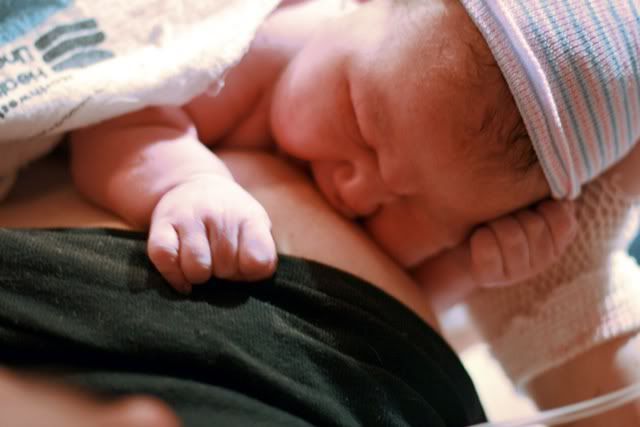
- You can have plenty of skin-to-skin contact. You and your family are less likely to strip your shirts off while visiting the nursery, but rooming-in allows for plenty of
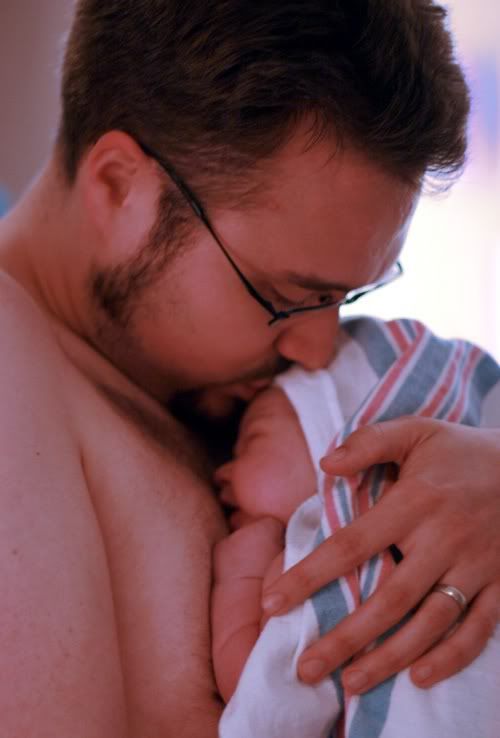 unhindered, relatively private access for skin-to-skin bonding. What's so great about being skin-to-skin? Naked newborns held against your skin experience warmth regulation (as well or better than an incubator!), increased success at breastfeeding, increased weight gain from the extra time spent breastfeeding and from the decreased time spent being agitated, and less crying due to decreased stress. Being snuggled against a mother's chest is the next best thing to those halcyon days in the womb! For the mother, skin-to-skin contact enhances bonding and, I can vouch, just makes you feel all cuddly. Others can get in on the act, too: I was so pleased to see my husband rip off his shirt just after the birth so he would be ready to hold his sweet newborn when the time came! You can place a blanket over the newborn's back, to keep the baby even warmer and preserve your modesty (if you want).
unhindered, relatively private access for skin-to-skin bonding. What's so great about being skin-to-skin? Naked newborns held against your skin experience warmth regulation (as well or better than an incubator!), increased success at breastfeeding, increased weight gain from the extra time spent breastfeeding and from the decreased time spent being agitated, and less crying due to decreased stress. Being snuggled against a mother's chest is the next best thing to those halcyon days in the womb! For the mother, skin-to-skin contact enhances bonding and, I can vouch, just makes you feel all cuddly. Others can get in on the act, too: I was so pleased to see my husband rip off his shirt just after the birth so he would be ready to hold his sweet newborn when the time came! You can place a blanket over the newborn's back, to keep the baby even warmer and preserve your modesty (if you want).
- You will be able to monitor and choose what tests and procedures your infant undergoes. Even when Mikko was across the room from me, I was worried that the nurses were doing things to him that were against my express wishes. When he was right on top of my chest, I knew I'd be able to see every test or procedure they laid on him. There were several routine procedures I refused, such as the Hep B vaccine, and others I wanted at a certain time or in a certain way, such as delayed cord clamping, and I was nervous that the nurses were ignoring my orders. It's not so much that I suspected a conspiracy as that I was asked multiple times if I wanted a certain procedure, and it made me wonder if my refusals were being written down in the chart or not. I also wanted to make sure they didn't perform an unnecessary circumcision on him.
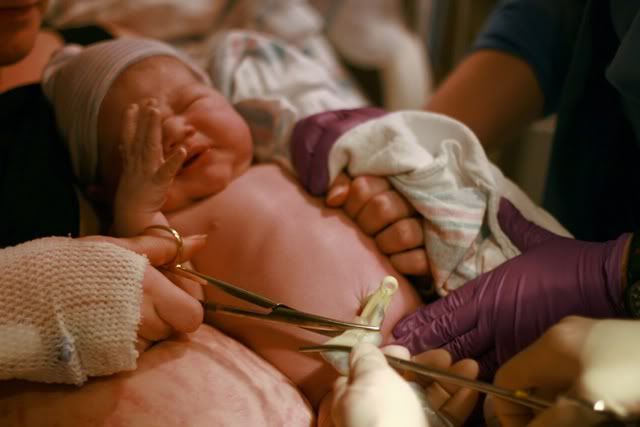
- Your baby will be calmer during after-birth tests and procedures. Besides allowing you the power of observation, keeping your baby close during the hospital routines relaxes and soothes your baby. Since Mikko was such a big little guy (nearly 12 pounds), the nurses wanted to monitor his blood sugar with heel pricks all night. If they did the heel prick while he was nursing, he didn't complain. They first rubbed off some of the blood and fluids while he was lying on my chest, and his first bath happened in my presence.
- You will be able to protect your baby. This is perhaps even more paranoid, but if your baby is with you the entire time, you will never have any fears of an accidental hospital switch! (This comes up when your tot is behaving so unlike your own calm self and you begin to wonder aloud, Could this screaming child really be mine? Rooming-in tells you: Yup.) Along less paranoid lines, limiting your newborn's exposure to other people limits exposure to other germs, and the increased breastfeeding brings with it its own protective benefits; with such an immature immune system, your baby is safest in familiar arms.
- You will receive more education on how to parent. You might or might not appreciate
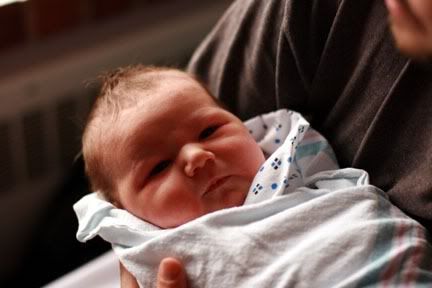 this, actually! Every nurse or doctor who came in would demonstrate something on Mikko and teach us a tidbit, showing us how to wrap him like a burrito (which he immediately fought loose of, every time) or how to bathe him, saving wetting his hair for last. I found the teaching a bit condescending, in truth, but I can see how it would be helpful for some new parents. If your baby is separated from you in a nursery, much of the routine care will be done outside your presence, and there won't be opportunities to witness or practice it for yourself.
this, actually! Every nurse or doctor who came in would demonstrate something on Mikko and teach us a tidbit, showing us how to wrap him like a burrito (which he immediately fought loose of, every time) or how to bathe him, saving wetting his hair for last. I found the teaching a bit condescending, in truth, but I can see how it would be helpful for some new parents. If your baby is separated from you in a nursery, much of the routine care will be done outside your presence, and there won't be opportunities to witness or practice it for yourself.
There are so many intangibles, too. I just can't imagine having missed those precious first hours and days with my son. I was the one who cut the cord connecting us (it all felt so symbolic!), and I was the one who first held and cuddled him. I was able to chat happily with the midwives and nurses about the feat I had just performed, pushing him into this world, while we all oohed and aahed over his size and his cute scrunchy face with those cheeks we knew even then were destined to be adorable. To have him remain on my chest, sleepy and warm, left me all the time I needed to peer into his unfamiliar features and learn who he was. Sam and I were both
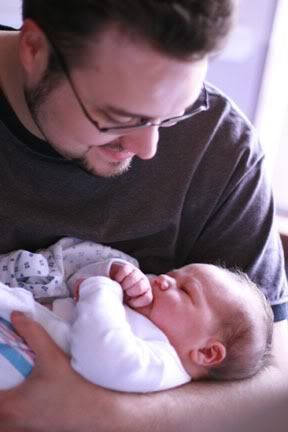 ecstatic with our newest addition, and giddy from the successful birth, and we appreciated that time the three of us had to bond and accustom ourselves to each other.
ecstatic with our newest addition, and giddy from the successful birth, and we appreciated that time the three of us had to bond and accustom ourselves to each other.Did I mention Sam was rooming in, too? Yep, he was — on a day bed under the window. It was a precursor to our now three years of rooming-in at home!
If you're planning a hospital birth, ask if rooming-in is standard practice. If not, either find a different hospital or request and receive permission to room in, and write it into your birth plan. Be prepared, or ask an advocate in advance (partner, family member, friend, doula), to insist on your right to keep your baby with you following the birth. If you're planning a home birth, you might find out from your midwives what hospital they generally transfer to in case of a problem; my midwives had a preferred hospital that was breastfeeding-friendly and amenable to rooming-in, so we drove further to get to that one. (I was not in an emergency state; otherwise, we would have gone to the closest hospital, of course.)
I love this video from Lamaze International highlighting all these benefits:
Keep your baby with you after your birth, and enjoy those newborn snuggles right away!
Did you room in after your birth(s)? What effect did either rooming-in or not have on your first days or weeks with your newborn?









 I'm Lauren Wayne, writer and natural parent. I embrace attached parenting with an emphasis toward green living.
I'm Lauren Wayne, writer and natural parent. I embrace attached parenting with an emphasis toward green living. 


7 comments:
That picture of Sam and Mikko (with Sam's shirt off) made me choke up a little. That is super sweet.
We had Kieran in a birth center, so he was supposed to be in with me the whole time after birth. At some point (I'm not sure when, I was so exhausted b/c I hadn't slept in 2 days) they took Kieran away because of "breathing problems." (I have that in quotes b/c once the ambulance took him away, no one ever observed any other "breathing problems" - I'm convinced it was his pectus excavatum that made it look like his chest was not rising/falling properly.) Anyway, part of the allure of the birth center was definitely the fact that rooming in was protocol.
Of course now we would opt for a home birth.
My first child was born at 34 weeks, in the hospital, and was removed within a few minutes of birth to the NICU. This was not a situation that I had any control over, or really any options in. In spite of the fact that her Apgar scores were excellent and she was breathing well, they bundled her up like a burrito and took her away.
My second child was born at 39 weeks, also in the hospital. We went home 4 hours after his birth, without spending a night there. Our time in the hospital post-birth was spent skin-to-skin, breastfeeding. And then at home, obviously, we were rooming in.
My firstborn really struggled with breastfeeding, as did I. I also suffered from postpartum depression that I didn't experience the second time. There are a number of reasons for this, but I believe that the separation I experienced the first time and no the second was the biggest factor.
What marvellous pic you've got. I hardly have any from our hospital stay. Then again, she 'had' to spend a day in NICU.
Putting this in SUnday Surf!
I wish I'd known I would get more sleep with my daughter in my room. I had suffered insomnia for three nights before she was born and being a first time mom I didn't trust I would know what to do when she woke and having had a c-section I hurt too much to move. Plus, I was bloody tired! I ended up not sleeping anyway. It is my biggest regret and I feel guilty about it to this day. I was so ignorant then.
I totally agree with the fact that every parent should take the option of keeping baby in your room after birth. Bonding with baby is so important and getting used to him/her as well. Great piece.
Dionna: Ugh! I'm sorry you had to be separated so soon after birth. That's the one thing that makes me glad(ish) that we had a hospital birth after all. I had a fever still and was dehydrated and had a lot of bleeding, and I have this suspicion I would have been transferred to the hospital (quite possibly in an ambulance), and at that point who knows if I'd have been separated from Mikko and for how long. But I still think a home birth where everything goes right would be so stinking cozy. My friend just had one, and I'm all kinds of jealous. Birth in the pool one minute, the next snuggled up as a family on their own familiar couch. Sigh.
Amber: I'm glad to hear your experiences, and the differences it made to have that rooming-in the second time around. I mean, obviously there's only so much you can (or want) to do when your newborn (especially a preemie) has potential complications, but there are consequences even so. I've heard that more NICUs are being encouraged to practice rooming-in, which was encouraging to hear. Kind of sad that it's not the norm yet, though. I don't get how all this research says kangaroo care is better than an incubator, yet preemies keep being taken away from that skin-to-skin contact. What gives?
mamapoekie: Thank you! We took barely any pictures during the birth (feeling alternately discouraged / out of it / not wanting to jinx things, I don't know), so we tried to get a bunch after the fact! :)
Melodie: It is so true, isn't it? It's hard when you're a first-time mom and don't know that (a) you can sleep with your baby and (b) you're unlikely to sleep without! I was fortunate, I'm seeing, in that the hospital I was at encouraged rooming-in and winked at cosleeping, which was officially discouraged but unofficially encouraged — as in, the nurses arranged Mikko in the bed with me without prompting. They're a breastfeeding-friendly hospital, and it really is the best way for a newborn to breastfeed, after all.
the pictures of that emotional bonding between parents and the baby made me emotional, they are so true to life and so original that you connect to them instantly..
Post a Comment